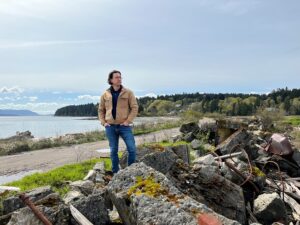Chippewas of Georgina Island First Nation journalist hosts new Kuper Island podcast

By Rick Garrick
KUPER ISLAND, B.C. — Chippewas of Georgina Island First Nation investigative journalist Duncan McCue’s examination of an Indian Residential School that survivors called Alcatraz is featured in CBC’s new eight-episode podcast series Kuper Island. The podcast launched on May 17 on CBC Listen and everywhere podcasts are available.
“I’d been a reporter in B.C. for almost 20 years so I had heard a lot of bad things about the Kuper Island school,” says McCue, host of the Kuper Island podcast and CBC journalist. “This is a school where in the first 30 years of its existence, nearly 40 per cent of the children died. It’s a school that had one of the highest rates of sexual abuse complaints from former Survivors.”
McCue says the Kuper Island Indian Residential School was located on Penelakut Island in the Salish Sea north of Salt Spring Island and east of Vancouver Island.
“You have to ask yourself why over the course of its 85-year history, children kept trying to run away from the place?” McCue says. “Why do Survivors to this day call it Alcatraz? So all of those things made us choose to focus in on this one school, Kuper Island, and hopefully help our listeners understand the broader story of unmarked graves right across this country.”
McCue says the podcast is about the story of four children, three who survived their time at Kuper Island Residential School, Tony, James and Belvie, and one who didn’t.
“They shared their truths with an intimacy that will make you laugh and cry — and may help you understand how we move forward from the shameful legacy of Indian Residential Schools toward a fairer and more courageous country,” McCue says. “They told us about one child, whose name is Richard Thomas, who a lot of people in the community of Penelakut told us about who passed away in a very awful manner. We wanted to try to go beyond the cold, hard numbers of unmarked graves that we’ve been hearing about for the better part of a year and try to put a human face to those children.”
McCue says they tried to tell the story through the children’s perspective, the story of the community and the struggle they face in terms of dealing with the unmarked graves and missing children.
“And what it’s going to take for them to be able to heal and start to recover from the experience,” McCue says. “One of the things that’s interesting about Penelakut is that long before unmarked graves were making headlines, Penelakut’s been at this work for quite a while, they started their GPR (ground penetrating radar) search in 2014. There have been 167 recorded deaths in the school’s history [and] they are still trying to get a handle on the numbers and where all those children are buried.”
McCue says he also wanted to help people understand that the deaths of children at Indian Residential School aren’t a thing of the past.
“These tragic deaths travel like ripples over water, touching generations,” McCue says. “These were children who were loved and had dreams – and their loss still impacts Indigenous lives today.”
McCue says one episode of the podcast will be released per week after the initial launch on May 17.
“Podcasts have really exploded particularly during the (COVID-19) pandemic, it’s a way that people want audio stories, but if Canadians last summer said, ‘Yeah I’d really like to learn more about Residential Schools,’ there’s not much content in the podcast niche about Residential Schools,” McCue says. “For Canadians who want to learn more about unmarked graves at Residential Schools and life at Residential Schools and why it’s such an important part of our history, a podcast about Kuper Island might be a way for them as an entry point to start learning.”


